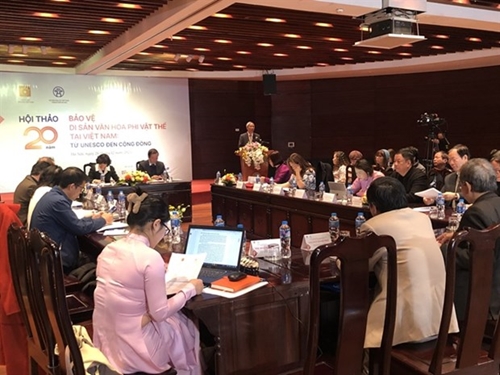The event was jointly held by the Vietnam Cultural Heritage Association and the Hanoi Department of Culture and Sports on the occasion of the 20th anniversary of the UNESCO Convention for the Safeguarding of the Intangible Cultural Heritage (2003 Convention). Vietnam was one of the first 30 countries to join this important international convention on September 5, 2005.
    |
 |
|
The workshop is held on the occasion of the 20th anniversary of the UNESCO Convention for the Safeguarding of the Intangible Cultural Heritage. |
Participants said Vietnam was one of the first countries that included matters regarding intangible cultural heritage in their cultural heritage laws, which, they said, has significantly contributed to cultural heritage preservation achievements over the past 20 years, and balancing conservation and promotion activities.
Nong Quoc Thanh, Deputy Director of the Department of Cultural Heritage under the Ministry of Culture, Sports and Tourism, said Vietnam was the first country to ask the Intergovernmental Committee for the Safeguarding of the Intangible Cultural Heritage to remove a heritage element from List of Intangible Cultural Heritage in Need of Urgent Safeguarding, referring to the case of Xoan singing, a folk music genre in Vietnam.
Highlighting joint efforts in cultural heritage protection in Vietnam, the official affirmed that as a member of the Intergovernmental Committee for the 2022 – 2026 term, Vietnam will continue to share its experience, make greater efforts, and promote its responsibility in safeguarding the intangible cultural heritage of humanity.
The participants also raised proposals to improve the efficiency of intangible cultural heritage safeguarding in Vietnam, including adjustments and supplements to the Cultural Heritage Law.
Vietnam possesses a total of 15 intangible cultural heritage elements recognized by UNESCO.
Just a few examples of these include the Nha Nhac - Vietnamese Court Music, Space of Gong Culture, Quan Ho Bac Ninh Folk Songs, Ca Tru Singing, and the Giong Festival of Phu Dong and Soc temples.
Source: VNA